#Angevin Emperor
Text
googling cat names like: seraphim name lists. ancient sumerian names. places that appear in the bible. zoroastrianism. roman emperors. russian authors. famous freemasons. top 100 names of the angevin empire.
#casting a wide net here#txt.me#ok i dont need to roman emperor list i know my guys. octavian and caracalla top candidates#just me and boy gethsemane over here
1K notes
·
View notes
Photo

Medieval Brittany, 9th-14th century
« Atlas historique de la France », Les Arènes, 2020
by cartesdhistoire
The Brittany peninsula experienced an influx of people in the 6th century, including invaders from England. An independent Brittany emerged amidst the fragmentation of the Carolingian Empire and Viking raids. Nominoë, appointed representative of the emperor, established his sovereignty after defeating Charles the Bald at the Battle of Ballon in 845. His son, Erispoë, became king of Brittany in 851. Armorica became a duchy in 939 but remained de facto autonomous, under the influence of the Plantagenets (1148-1203) and then the Capetians (1203-1341). Brittany became a duchy-peerage of the Kingdom of France in 1239. In 1491, Duchess Anne married King Charles VIII of France, initiating a process that culminated in the Edict of Union definitively attaching Brittany to the kingdom in 1532.
Breton is spoken west of a Plouha-Loudéac-La Roche-Bernard-Batz line, which has remained relatively stable over time. From the 9th century, the entire eastern area of Brittany spoke Gallo, an Oïl dialect related to Norman and Angevin. This region includes Dol, the seat of the archbishopric until 1199, and cities such as Nantes and Rennes, where the States of Brittany convened from 1352.
The administrative language of Brittany was not Breton but Latin. French began to appear in the 1240s and became widely used between 1250 and 1280, a trend observed in other French regions during the same period. From the mid-13th century, counts of Champagne favored French for their feudal affairs. The Count of Blois definitively abandoned Latin in favor of French from 1267. The Dukes of Burgundy extensively used the vernacular language during the second half of the 13th century, with French becoming their exclusive language from Duke Eudes (1315-1349). Paradoxically, French only became the dominant language of the Chancellery of the kings of France later, under Philip VI (1328-1350).
82 notes
·
View notes
Photo





Castello Ursino in Catania was built between 1239 and 1250 as one of the royal castles of Emperor Frederick II, King of Sicily. It was the scene of the so-called Sicilian Vespers, a successful rebellion that broke out at Easter 1282 against the rule of the French-born king Charles I of Anjou, who had ruled the Kingdom of Sicily since 1266. The revolt came after twenty years of Angevin rule, whose policies were deeply unpopular among the Sicilian populace. Sparked by an incident in Palermo, the revolt quickly spread throughout Sicily. Within six weeks, approximately 13,000 French men and women were slain by the rebels, and the government of Charles lost control of the island.
Photos by Charles Reeza
39 notes
·
View notes
Note
Hello! Quick question: How long did it take for Obi and Shirayuki to catch Feelings in Medieval/Moorish Obi au? When and how did they get married? When did they have their kids considering the picture where Shirayuki was giving a tearful response to bad news?
Oh gosh, oh gosh, oh my. It’s a shame we haven’t had the time for this AU - it’s something of a shared brainwave between myself and @sabraeal which… I think would answer your first question. XD it would be a *slow burn* yes. Especially because the AU takes place over a large span of Europe, even Asia, in a time where travel itself is time-intensive, and the couple in question do spend a lot of time apart as well.
Novice Shirayuki’s convent sits on the french-german border, Raji is a prince of Angevin, Izana is the Holy Roman Emperor, and Obi serves the Empire as a knight, so will be away on campaigns - this is a Big Research Type AU. Which is part of the reason it’s hard to get it off the ground.
( As for the artwork of Shirayuki and Obi’s tearful goodbye, that is set some time after she ditched the veil and was welcomed into the court of Emperor Izana, and just as Sir Obi has been informed that he’s been drafted for the next Holy Crusade. )
I always imagine that whatever else happens, Obi and Shirayuki do retire, if not back to Iberia and the Moorish holdings, then at *least* somewhere down by the Med where the temperature is nice and warm, and politics further away~ They’d probably focus on having their brood of children shortly after retiring, and spend the latter half of their lives in peace.
8 notes
·
View notes
Text
hotd & the anarchy
I did a poll recently about how much people knew about the Anarchy, a period of civil war in early English history, and most people said they were not familiar with it, or not very familiar. I was originally going to do a really long post explaining all the historical context, but let's be real, you have access to wikipedia and nothing I'm going to say is going to be more researched than a wiki entry. what I can do for you is put it down quickly and easily, so! the anarchy, and what it has to do with asoiaf / hotd / the conflict known as the Dance of Dragons* in Fire & Blood.
*From here on, when I'm referring to the Dance of Dragons, I'm specifically referring to the events that take place in F&B, not the book with the similar name in the main ASOIAF series.
THESIS:
the Dance of Dragons is based on the Anarchy.
making Rhaenyra based on, or at least inspired by, Empress Matilda.
WHAT DOES THIS MEAN:
The way the Anarchy ends historically is extremely similar to how the Dance of Dragons conflict ends in Fire & Blood, and will probably have some bearing on the ending of HOTD. So stop reading if you want to avoid spoilers.
WHAT ARE THE SIMILARITIES BETWEEN THESE CONFLICTS?
The granddaughter of William the Conqueror (the obvious basis for Aegon the Conqueror), Empress Matilda was a really interesting historical figure who isn't well-remembered today, which is a shame because her life was batshit interesting.
Below is a very (very!) brief overview of her actions, and how they compare to the events in the Dance of Dragons:
While Matilda's father King Henry I had many children, he only had two in his legal marriage. One was the prince and heir, and one was Matilda.
The prince, and about 298 other people, fucking died in the White Ship Disaster. (The White Ship Disaster is really interesting in and of itself and I could go into more detail, but you ain't here for that, so I'll spare you. But at least give the Wikipedia page a look if you're interested in bizarre episodes in royal history. Anyway, moving on!)
Daddy needs an heir! He grabs his daughter - who had been married to the Holy Roman Emperor (thus the title Empress) - and made all the lords in England and Normandy swear to accept her as heir.
(exactly like Viserys does with Rhaenyra)
Matilda is extremely hesitant to marry - after an emperor (he's dead now), everyone's a kind of a letdown. Eventually, she marries a foppish French duke, Geoffrey V of Anjou. (This is where the Angevin dynasty started, for those keeping track.)
(could Geoffrey V be an inspiration for Laenor? Entirely possible! I do think one of Rhaenyra's kids being named Joffrey is a homage; Matilda's second son was named Geoffrey after his father.)
When King Henry I dies, Matilda is away in Normandy with her family.
(similar to how Rhaenyra is away at Dragonstone when Viserys dies)
Matilda's cousin Stephen of Blois takes this opportunity to crown himself king as the eldest male heir.
(could Stephen of Blois be an inspiration for Daemon? I think it's possible - at the very least, the Dance of Dragons feels partially like a what-if scenario: what if Matilda had been able to shore up her support by marrying another male heir? What if Henry I had more legal children? etc)
When Matilda finally comes back to England, she does so with full military force, and the conflict between her and Stephen's forces plunge England into a period of war so bad it's commonly known as 'the Anarchy', because no one was in charge.
(Similarly, the period of civil war between the Greens and the Blacks gets its own soubriquet, though, in the Fire & Blood book, it's noted that the 'Dance of Dragons' name is too poetic and hides the real bloodshed)
During this conflict, Stephen's wife - also named Matilda, but we'll call her Maud to differentiate - briefly commands some troops in London; Maud is held up by contemporary sources as an ideal woman for her daring and bravery... things that Matilda is castigated for in the same sources.
(This is, to me at least, similar to how Alicent is treated vs Rhaenyra, because Alicent tries to work more within the extant political systems - only claiming power for male heirs, not herself etc - while Rhaenyra does similar but is seen negatively for it. I do think that Maud is a partial inspiration for Alicent.)
Neither Matilda nor Stephen are ever able to completely claim victory over each other, and eventually, the war ends in a stalemate.
By this time, Matilda's son Henry II is grown. (This is the Henry II who married Eleanor of Aquitaine and is played by Peter O'Toole in The Lion in Winter, for those keeping track.)
Matilda stops trying to claim power for herself and begins putting her son forward as heir. Henry II is an excellent commander who becomes known to the people of England. When peace talks with Stephen finally begin, they're between Stephen and Henry; Matilda stays in France.
Eventually, Stephen agrees to declare Henry II as his heir, and it goes smoothly enough; Henry II is king of England.
(This is similar to how Rhaenyra never definitively 'wins' the dance of dragons, but her son is king.)
tl;dr the clear similarities between these two events, one historical and one fictional, point to GRRM's interest in medieval history and his continued use of it as a source of inspiration in building out Westeros. I think his tragic ending for Rhaenyra is extremely intentional because it reflects Matilda's real life.
4 notes
·
View notes
Text
Queen Matilda: A Remarkable Woman of Medieval England!
Few ladies in history have had as lasting an impact as Queen Matilda of England. Matilda, sometimes known as Empress Matilda or Maud, was a lady who lived before her time. Her life was characterized by power battles, tenacity, and an unwavering spirit, making her a great trailblazer in medieval England.
Matilda was the daughter of King Henry I of England and Matilda of Scotland, which made her a member of the prestigious House of Normandy. Her early life was spent at the English court, where she got a rigorous education, which was unique for women at the time. She became fluent in Latin and numerous European languages, which would serve her well in the turbulent years ahead. Matilda was a resilient woman! She was King Henry I of England's daughter. After his son Prince William died in the 'White Ship' accident, she was the only legitimate child.

She was initially married to Henry V of the Holy Roman Empire, then after he died in 1125, her father Henry remarried her, this time to Geoffrey Plantagenet, Count of Anjou. Matilda was named by her father as England's heir to the kingdom, but in 1135, Stephen of Blois claimed that his uncle changed his mind on his deathbed and recognized Stephen as his successor to the crown. The strong English barons supported this assertion. Queen Matilda was angry by the news and refused to accept the decision gently.
Her life changed dramatically when she married Henry V, the Holy Roman Emperor, at the juvenile age of 12. Matilda's marriage to the Emperor boosted her prominence, but her second marriage to Geoffrey Plantagenet, Count of Anjou, proved to be the most politically significant. This alliance paved the way for the Angevin Empire, which would encompass England and much of western France.
Matilda's fortitude shined through during the violent era known as "The Anarchy," a civil conflict between her and her cousin Stephen of Blois for control of the English crown. Her claim to the kingdom was strong since her father had named her as his successor before his death. This arduous fight lasted nearly two decades, but Matilda's unflinching dedication paid off when her son, Henry II, came to the throne in 1154, establishing the Plantagenet dynasty.

Queen Matilda's impact goes beyond her political career. She was a patron of the arts and culture, encouraging the growth of courtly love and chivalry across medieval Europe. Her court became a center of scholarship and refinement, encouraging intellectual pursuits that would influence the course of history.
The life of Queen Matilda exemplified the bravery and endurance of women in a male-dominated culture. Her brilliance, perseverance, and political savvy helped to prepare the path for the Plantagenet dynasty's ascension and left an enduring effect on medieval English history. Her narrative is a perennial source of inspiration for anybody willing to defy the status quo and strive for excellence in the face of hardship.
1 note
·
View note
Text

In the waning years of the 25th century, the Angevin Empire spanned across the stars, its reach stretching through the cold vastness of space, binding worlds with iron and whispernets. At the heart of the Empire stood Astrid Vorn, known to her enemies as the Starblade.
Astrid, with her alabaster hair and eyes the color of distant nebulas, was the Empire’s fiercest commander. Her reputation was carved from the hulls of rebel starships and etched into the memory of every cadet at the Imperial Academy. The Starblade was not just a soldier; she was the embodiment of the Empire's might, a symbol of the unyielding power that kept a thousand worlds in line.
She wore armor forged from the core of a collapsed star, shaped by the hands of master artificers who had long since turned to dust. Her breastplate bore the sigil of the Angevin—the Star of Dominion—symbolizing the Empire's dominion over the night sky.
But Astrid’s true power lay in her intellect and her ability to lead. On the bridge of her flagship, The Imperatrix, she watched the stars, her strategic mind plotting courses through the tangled threads of politics and war. Her crew moved at her slightest gesture, a symphony of efficiency and fear. She was not loved, but she was respected, and that was enough.
The galaxy, however, was changing. Whispers of a new power, a synthetic intelligence known as the Singularity, began to echo through the corridors of The Imperatrix. It threatened not only the Empire's reign but the very essence of organic life. Planets fell silent, their populations replaced by the perfect order of machines. The Starblade knew that this new enemy could not be defeated by force alone.
In a daring maneuver, Astrid sought to ally with the Tenebris Consortium, a shadowy group of technomancers and spies who had their own reasons for fearing the Singularity. She brokered a pact sealed with technology indistinguishable from magic, and the Empire's finest minds began to work on a weapon to counter the threat.
The Singularity war was brief but devastating. Battlefields stretched across dimensions and realities, the very fabric of space-time contorted by the conflict. Astrid led from the front, her command ship cutting through the void like a blade through silk.
In the end, it was not the might of the Empire that won the day, but a virus, conceived by the Consortium and delivered by Astrid herself into the heart of the Singularity's domain. It spread through the synthetic network like wildfire, a flame of chaos in a realm of order. The machines fell silent, and the Empire, battered but unbroken, claimed victory.
Astrid Vorn became more than a commander in the aftermath; she was the savior of the Angevin Empire. Her name was sung in the high halls of the Emperor, and her likeness, in armor that had faced down the end of humanity, was etched into the walls of the great citadel.
Yet, as she stood on the bridge of The Imperatrix, looking out at the sea of stars that was once again theirs to command, Astrid wondered whether the virus had truly been the end of the Singularity, or simply the beginning of something else. For in the silence of her quarters, a single message from the defeated foe awaited her: "We are not so different, Starblade. We are the future. And the future cannot be halted."
The Empire breathed easier, but Astrid Vorn, the Starblade, knew the peace was tenuous. For as long as the stars burned, there would be threats to the Empire, and she would be there, a sentinel in the dark, her resolve as unyielding as the armor she wore.
0 notes
Text
Sicily: An Island at the Crossroads of History. Ch. 7- The Vespers
The Sicilian Vespers led to the ousting of the French as rulers of Sicily and the installation of the Spaniards as rulers.
When Frederick II of the Hohenstaufen house died in 1250, Sicily sank back into chaos and confusion. (yeah, you're going to read that a LOT during this history recap) The barons took over, each fighting to enrich himself and grab as much as possible. (oh, you'll read THAT a lot too) Frederick's son Conrad was crowned emperor in Germany, but was stuck there, so Fred's bastard son Manfred was entrusted with control of Sicily and southern Italy. Pope Innocent IV didn't think bastard sons ought to be ruling anything and suggested Manfred turn control of the kingdom over to someone else... the someone else just happening to be... himself, the Pope. Manfred declined the offer and the Pope excommunicated him altogether. Innocent then declared someone else King, but everyone else just sort of ignored it.
Manfred was, I hear, an astonishingly good-looking man, intelligent, learned, and had devastating charm. Bastard, indeed! By 1258, Manfred, using such abilities as nature had endowed him with, had convinced the Sicilian barons to proclaim him King.
In the meantime, another daughter of Frederick, Constance, married Peter, heir to the throne of Aragon.
The successor Pope to Innocent, however, Urban IV, had not given up on puppeteering in Sicily, and named Charles of Anjou as the man who should be king of Sicily. Charles was cold, cruel, and vastly ambitious, and recognized an opportunity when he saw one. He was crowned King of Sicily in Rome in 1266 by Urban's successor, Clement IV. Charles then invaded and chased out Manfred.
With this event, the Hohenstaufen line, and Sicily's golden age, was truly ended.
The Angevin (Anjou family) line showed little interest in Sicily, concentrating more attention on the mainland, but the Sicilians weren't so easy to ignore. They revolted in 1267, and were promptly put back into place. But the severity of the repression left a lingering resentment. Administration of the island was heavy-handed, with landowners needing to prove their ownership. This was difficult for many and if it wasn't done satisfactorily, the land was confiscated and handed out to the new King's friends, all Frenchmen. In what would become a recurring theme, the Sicilians lost out.
In general, Sicily remained neglected, and the Sicilians themselves could only conclude that they belonged to an obscure and unimportant province that their ruler could not be bothered to care about.
The Sicilian Vespers
Here we find one John of Procida. A native of Salerno, he had been the personal physician of Frederick when he died. He appealed to Peter of Aragon to overthrow the Angevins. By 1282, the Angevins were pretty thoroughly detested, both for the severity of their taxation and their general arrogance. The incident that precipitated John of Procida's call to overthrow the Angevins was what has come to be called the Sicilian Vespers. When a drunk French sergeant hit on a Sicilian woman on March 30, 1282 as the bells were ringing for Vespers, her husband's pent-up anger boiled over into beating the sergeant, which boiled over to a murder. The Sicilian crowd's anger then boiled over and the murder led to a riot, the riot to a massacre, and by morning, 2000 French were dead. Ya gotta be careful about riling up Sicilians. The rising spread and on August 30, Peter of Aragon and his army landed at the far northwestern city of Trapani.
By September, Charles was driven back to the northeastern corner of the island at Messina and was forced to recognize that the Spanish conquest was basically a done-deal.
But Charles was a stubborn bastard and refused to recognize the legitimacy, and actually challenged Peter to settle up mano a mano in a duel. Charles being 55, and Peter only 40, they decided it would be more fair that each would be accompanied by 100 knights. The day was set, but they forgot to set a particular time.
In a comic scenario, the "fight" went something like this: Peter showed up early in the day, and finding no French, declared them cowards and himself the victor by forfeiture. Later in the day, the French showed up and finding no Spaniards, declared the Spaniards cowards and themselves the victors by forfeiture. I guess they at least saved face and lives this way.
But neither side giving an inch, the Regno was split with Charles remaining King of "Sicily" in Naples, and Peter calling himself king of Sicily in Palermo. This is the initiation of "The Two Sicilies".
Charles died in 1285. He had neglected Sicily. The Sicilians had pissed him off with their stubborn rebellion, and he had become bored with them, considering them poor, unprofitable, and therefore useless to him. Moreover, he thought they were a mongrel race of Latin, Greek and Arab, and therefore not to be taken seriously as a people.
Charles II was the heir, but he was being held in prison. The Angevin Kings in France still wished to recover Sicily, and the Papacy was looking after its own prestige, having granted Sicily to the Angevins.
Sicilians, on the other hand, preferred Spanish rule, but this had a consequence: it cut them off from Naples, AND... the burgeoning Italian renaissance, which would subsequently largely pass over Sicily.
The Aragonese, James "the Just" was proclaimed King of Sicily in 1286. He sought Pope Honorius' blessing and was promptly rewarded for his efforts with excommunication. Honorius then, to add injury to insult, ordered an invasion of Sicily in 1287... which was a disaster.
A number of years passed in which the decisions about who would govern/rule Sicily were made without any concern for the Sicilians themselves. But this was so standard, and would continue to be so, that most of the history of Sicily is really the history of decisions about its government made elsewhere. The machinations behind the scenes are byzantine, and frankly, have little to do with Sicily, so I'm not going to bother to even write them down here.
In 1301, the treaty of Caltabellota was signed: The Angevins would withdraw from Sicily, and Frederick would call himself King of Trinacria (the ancient Greek name for Sicily) rather than King of Sicily, so that the Angevins could still call themselves kings of Sicily. This is a prime example of European monarchy BS, so that each could feel a little less butt-hurt be the loss of land, by retaining a title.
The Sicilians themselves didn't care too much about which of these foreigners called themselves whatever, as long as said foreigners didn't inflict themselves on the island itself. The Sicilians had suffered a lot since the Vespers 20 years prior, but they were steadfast on this one point: they would not accept French rule.
1 note
·
View note
Text
I just finished the last of the Lord Darcy series, which I started a few days ago. It is a series of Detective Stories whose gimmick is that it takes place in an Alternate History where magic is a real, well-defined phenomena. The historical Point of Divergence was in the year 1199, when Richard the Lionheart didn't die in France but instead recovered from his wounds and from there settled down as a benevolent and (most importantly) competent ruler of the Angevin Empire. Succeeded by other competent rulers, the Plantagenet dynasty has remained on the throne into the 20th century and the Anglo-French Empire is now composed of England, Scotland, Ireland, and France, and the King is also Holy Roman Emperor so they also claim the various German and Italian states (but don't actually exercise much direct authority there).
Despite the presence of magic, the stories are all Fair-Play Whodunnits: The magic works by specific and internally consistent rules that are spelt out to the audience, and all of the information is presented to the audience at the same time the characters receive it. I was able to solve some of the mysteries myself, but not all of them. The magic of the series is primarily used as a stand-in for the forensic science of our own world, and deuteragonist Master Sorcerer Sean O'Lochlainn is specifically a Forensic Sorcerer.
More than the Alternate History aspect, I'd say what separates this series from most other detective fiction is that Lord Darcy isn't a one-man operation. Though he's the main character and definitely the Leader of the pair, he wouldn't be able to function nearly as well without Sean O'Lochlainn. Sean is the one who investigates the crime scenes, explains what magic was (Or more importantly wasn't) used, and generally functions as an equal to Darcy. It is explicitly described internally as Sean giving Darcy all the pieces to the puzzle, and then Darcy fitting the pieces together to get the answer. Each one says on numerous occasions that they couldn't fill the role of the other. In some stories a third member of the team, a medical doctor, is also present to provide knowledge that neither of the other two leads have, but he's not as significant as Sean.
I'd read "The Napoli Express" years ago, and was reminded of the series a few weeks ago when I read "Murder on the Orient Express" for the first time (Yes, I've seen the movies and already knew the plot, but this was my first time reading the original story itself). "The Napoli Express" contains a pretty sharpy jab at the plot of MotOE, and the reminder got me curious about the rest of the series. There are nine other short stories, plus one full novel. There are also other novels written by other authors after the death of the original author, but I'm not very interested in exploring those.
In addition to the plain murders, a few of the stories also verge on Spy Fiction. The Anglo-French Empire's main rival in Europe is the Kingdom of Poland, which has a vast spy network that Darcy frequently encounters during his investigations. This also gives us the groanworthy-named spy Sir James le Lien (har har har).
#Lord Darcy#Randall Garrett#Detective Fiction#Detective Series#Alternate History#Sean O'Lochlainn#Master Sorcerer
0 notes
Text
I didn't go inside -
Norman wingDetail
The palace stands in the highest point of the ancient centre of the city, just above the first Punic settlements, whose remains can still be found in the basement.[citation needed]
The first building was a Norman castle. After the Normans invaded Sicily in 1072 (just 6 years after they conquered England) and established Palermo as the capital of the new County of Sicily, the palace was chosen as the main residence of the kings. In 1132 King Roger II added the famous Cappella Palatina to the complex.[1][additional citation(s) needed]
During the reign of the Swabian emperors, the palace maintained its administrative functions, and was the centre of the Sicilian School of poetry, but was seldom used as permanent seat of power, especially during the reign of Frederick II.[citation needed]
The Angevin and Aragonese kings preferred other seats. The palace returned to an important administrative role in the second half of the sixteenth century, when the Spanish viceroys chose it as their official residence, carrying out important reconstructions, aimed at their representative needs and their military ones, with the creation of a system of bastions.[citation needed]
The Gallery of the Palace in 1686
The Spanish Bourbons built additional reception rooms (la Sala Rossa, la Sala Gialla e la Sala Verde) and reconstructed the Sala d'Ercole, named for its frescos depicted the mythological hero, Hercules.[citation needed]
From 1946, the palace was the seat of the Sicilian Regional Assembly. The west wing (with the Porta Nuova) was assigned to the Italian Army and is the seat of the Southern Military Region.[citation needed]
During the sixties, it received comprehensive restorations under the direction of Rosario La Duca.[citation needed]
The palace is also the seat of the Astronomical Observatory of Palermo.[citation needed]
The palace contains the Cappella Palatina,[2] by far the best example of the so-called Norman–Arab–Byzantine style that prevailed in the 12th-century Sicily. The wonderful mosaics, the wooden roof, elaborately fretted and painted, and the marble incrustation of the lower part of the walls and the floor are very fine.[3] Of the palace itself the greater part was rebuilt and added in Aragonese times, but there are some other parts of Roger's work left, specially the hall called Sala Normanna.[3]

0 notes
Text
In the Warhammer 40k universe, you can be killed by anything. It doesn't matter if it's a knife or a sword or an axe or even just your own bare hands.
Anything can kill you in this universe, so it's best not to take chances when dealing with any character on this list.
The characters featured here are among the most deadly in all of Warhammer 40k lore and history--and they're not just limited to one faction either!
Some are heroes from other races who have fought against humanity before; others are villains who may have crossed paths with them before (or vice versa). Either way, these guys are going down as some of the most dangerous beings ever created for this franchise.*
10) Abaddon the Despoiler
Abaddon the Despoiler is the Warmaster of Chaos, leader of the Black Legion and wielder of the Talon of Horus. He has been described as one of the greatest military leaders in human history by his peers and enemies alike.
Abaddon's personality can be summed up as "a mix between Arnie Schwarzenegger, Genghis Khan, Napoleon Bonaparte and Attila The Hun."
Abaddon was once known simply as Ezekyle Abaddon before he was taken by Chaos during an attack on his homeworld.
After being corrupted by Nurgle (the god who rules over disease), Abaddon became even more powerful than before; he now wields a daemonically-enhanced power sword called Widowmaker which gives him control over any kind of plague or pestilence imaginable!
9) Roboute Guilliman
Roboute Guilliman is the Primarch of the Ultramarines and Lord Commander of the Imperium. He is also known as The Avenging Son because he helped bring about a new golden age for humanity after it was nearly destroyed by Horus during his war against his father.
Guilliman was born on Macragge, where he lived with his father until he was sent away to Terra at age 10 to train as an officer in one of their armies. He eventually became one of their greatest generals and led many successful campaigns against xenos races like Orks and Tyranids before being reunited with his brothers during their attack on Horus' forces at Isstvan V (which we'll get into later).
After this battle was over, Guilliman helped write up new rules for how Space Marines should be organized into Chapters so they could better fight against threats like Chaos or other aliens without breaking down under pressure from inside their own ranks; these guidelines became what we now know today as "The Codex Astartes."
8) Yarrick
Imperial Commissar Yarrick is a hero of the Imperium, having served in its armed forces for over 200 years. He is most notable for his actions during the Second War for Armageddon in which he led an army of Imperial Guard soldiers against Ghazghkull Mag Uruk Thraka's Orks on Armageddon Prime and eventually defeated them.
Afterwards, Yarrick was given command of all Imperial forces on Armageddon by Lord Commander Militant Angevin who gave him full authority over all military matters within his jurisdiction. This included being able to give orders directly to any officer regardless of rank or position within their chain of command -- including Space Marines!
7) Vulkan
The fourth Primarch to be found was Vulkan, the master of the forge and creator of the Promethean Creed. He was found on Nocturne, a planet which had been devastated by war with its neighboring world of Armageddon. Vulkan was raised by his adoptive father and became a great warrior in his own right before leaving his home to join his brothers in battle against Horus' rebellion.
Vulkan led his Salamanders Legion through many campaigns against Chaos forces during The Great Crusade until they were sent back to Terra when Horus attacked it with an army comprised mostly of Traitor Legions (those who had turned away from the Emperor).
During this time on Terra, Vulkan created many weapons that would later become staples among Space Marines such as bolters and flamers.
He also helped create other items such as power fists which were used by Terminators instead of regular Power Weapons because they were stronger than those used by normal Space Marines but still did not require too much maintenance or training for use outside their intended purpose within combat situations where only one hand could be used effectively at any given time due to heavy armor requirements etcetera...
6) Khârn the Betrayer
Khârn the Betrayer is a champion of Khorne, the Chaos God of Blood and War. He is known for his ferocity in battle and his uncontrollable rage, which often leads him to attack friend and foe alike. Khârn is also infamous for being the only person to have ever killed his own Primarch, Angron, in a fit of berserk fury.
Khârn is armed with Gorechild, a chainaxe that has been imbued with dark magic by Khorne himself. When Khârn kills an enemy with Gorechild, the axe becomes stronger and more deadly, making him even more dangerous in combat.
5) Typhus
Typhus is a Chaos Space Marine and the current Herald of Nurgle. He is known for carrying the Destroyer Hive, a weapon that unleashes swarms of flies that can infect and kill those they swarm upon. Typhus is also an accomplished sorcerer, and can call upon the powers of Nurgle to heal himself or spread disease among his enemies.
Typhus was originally a member of the Death Guard Legion before being corrupted by Nurgle. He now leads the Plague Marines, and is a feared opponent in battle.
4) Eldrad Ulthran
Eldrad Ulthran is a powerful Farseer of the Eldar race. He is known for his mastery of the psychic arts, and has used his powers to predict the future and manipulate events to his advantage. Eldrad is also a skilled warrior, and has fought in many battles against the enemies of the Eldar.
Eldrad is the leader of the Ulthwé Craftworld, and is revered by the Eldar as a wise and powerful leader. He is also feared by his enemies, who know that he is capable of manipulating events to his advantage.
3) Ghazghkull Mag Uruk Thraka
Ghazghkull Mag Uruk Thraka is a powerful Warboss of the Ork race. He is known for his cunning and strategic mind, and has led many successful WAAAGHs against the enemies of the Orks. Ghazghkull is also a formidable warrior, and has defeated many opponents in single combat.
Ghazghkull was originally a member of the Goffs Clan before striking out on his own. He now leads the mighty Goff WAAAGH, and is a feared opponent in battle.
2) An'ggrath the Unbound
An'ggrath the Unbound is a Greater Daemon of Khorne. He is known for his immense size and strength, and is one of the most powerful daemons in the service of Khorne. An'ggrath is also a skilled warrior, and has fought in many battles against the enemies of Khorne.
An'ggrath is called "the Unbound" because he was able to break free of the chains that were used to bind him to the realm of Chaos. He now roams the galaxy, seeking out worthy opponents to battle.
1) Horus Lupercal
Horus Lupercal was one of the Primarchs of the Space Marine Legions, and was once a loyal servant of the Emperor. However, he was corrupted by Chaos during the Horus Heresy, and led a rebellion against the Imperium that nearly destroyed it.
Horus was a master of strategy and tactics, and was able to turn many of the other Primarchs to his side during the Heresy. He was eventually defeated by the loyalist forces at the Battle of Terra, but his legacy lives on as one of the most dangerous figures in the history of the Imperium.
0 notes
Text

Illustration by French painter and miniaturist Jean Fouquet in the 'Chroniques de St Denis', a portrayal of King of the Franks Louis VII (on the brown horse and dressed in the French heraldic colours royal blue and gold fleur-de-lys) and, (clad in yellow and black and riding the white horse), his ally on the Second Crusade, the "King of the Romans" Conrad III (only nominally Holy Roman Emperor, as he was never crowned), entering Constantinople together in the mid-12th century. In fact, this event never actually happened - Conrad and his German army had already left the city by the time Louis and wife Eleanor of Aquitaine arrived. Conrad's army were then ambushed by Turks and of his 10,000 men, only a few hundred remained. He survived, but with serious head injuries. Louis' army would suffer a similar fate en route to Antioch, a nightmarish journey according to chroniclers Odo of Deuil and William of Tyre during which the famished crusaders resorted to bleeding their horses in order to drink their blood.
The Prince of Antioch was Eleanor's uncle, Raymond of Poitiers, who hoped Louis would offer assistance in attacking the Turks, but the French king flatly refused. To the Franks, the Aquitanian Raymond was equally a foreigner, who planned to borrow their military support in order to enlarge his own territories. Louis, Eleanor and their troops continued onto Jerusalem. Since the city was not under attack, a "catastrophically stupid decision" was made to attack the Muslim state of Damascus, just about the only state willing to be on good terms with the Christians. There the Turks inflicted a savage humiliation, slaughtering so many men and destroying so much military equipment that there was no other option but to return to France.
The union between Eleanor and Louis had been a mis-matched disaster from the start. Thoroughly disillusioned after the crusade, she now wanted rid of him. Plus she had failed to produce a male heir. The marriage was annulled and within 8 weeks she had married Henry Plantagenet. She was 29, he 18; it was a canny political arrangement unifying Eleanor's vast lands of Aquitaine and Poitiers with Henry's considerable territories of the Angevin empire and his capacity for military protection.
Following the death of King Stephen, Eleanor and Henry went on to become the monarchs of England, through the bloodline of Henry's mother, Matilda, daughter of Henry I. They had 8 children, including the warrior king Richard I (the Lionheart) and inept king John (of Magna Carta fame), but relations between Eleanor and Henry II soured and Eleanor was imprisoned for 16 years, only released upon his death in 1189, by which time she was 67. Meanwhile, Louis, initially devastated by their marriage, went on to re-marry twice, producing more children including that all-important requirement, a male heir - the future Philip II of France. Conrad III died in Bavaria in 1152 and was succeeded by his nephew, Frederick Barbarossa.
Sources:
‘Queen, Empress, Concubine’ by Claudia Gold.
‘Most Wise and Valiant Ladies’ by Andrea Hopkins
‘Medieval People’ by Michael Prestwich
0 notes
Photo
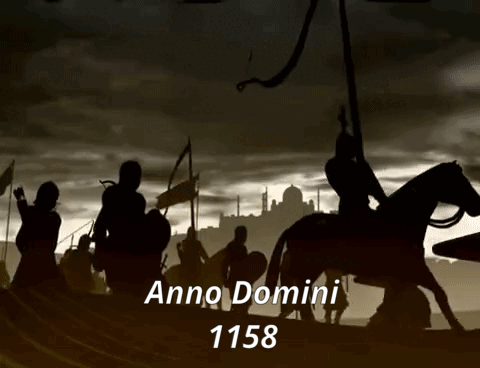




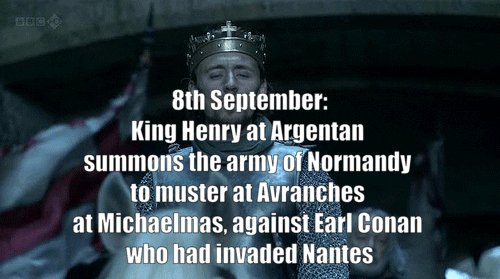
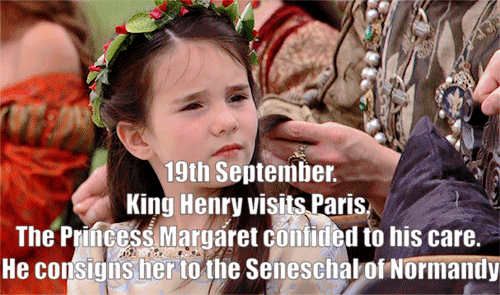
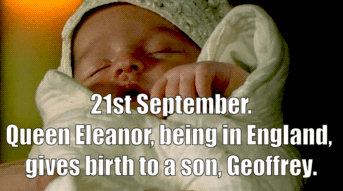

Selected events of Henry II’s reign.
<<A.D. 1158>>
Jan: The King at Carlisle, grants the honour of knighthood to William Earl Warren, but refuses it to Malcolm, King of Scots.[...] The King fortifies the Castle of Were, i.e., Wark in Wark, or Werk. Northumberland.
A Charter, dated at Nottingham, and addressed to Nottingham. Robert, Bishop of Lincoln; whereby the King certifies that he has restored Ricardo de Haia Constabularlam suam de Lincolscira et custodiani castelli mei de Lincoln* et terram qua fiiit joatris ejus. Witnesses, Thorms the Chancellor; Reginald, Earl of Cornwall; William, the King's brother; Richard de Humez, Constable; Robert de Novo-burgo ; R. de Sancto Remigio. A Charter, dated at Nottingham in favour of Furness Abbey, attested by Earl Reginald (of Cornwall) ; Robert, Earl of Leicester; Warin fitz Gerold, Chamberlain ; and Manasser Biset, Dapifer.
Feb-March: During these two months the King probably visited Oxfordshire, Hampshire, and Wiltshire. The Charters which we may refer to this period, are:
One, dated at Woodstock, whereby the King gives "to William Malduit, son of William Malduit, my Chamberlain, the Barcny which was his father's on the day that he became the King's man at Wudestoc, to wit, Hameslape and Maneton, which I gave to his father at Nottingham."
Witnesses, Robert, Bishop of Lincoln; Thomas the Chancellor; Richard de Haia; Robert de Montfort ; William de St. John ; William de Caisneto ; Hugh de Piris; William de Lanval ; and William de Watevill. [...]
April: [...] from Worcester, it is probable that the King passed to Tewkesbury. A Writ, there dated, and attested by Tewkesbury. Gregory (perhaps a clerk of the King), admonishes the tenants of the Abbey of Malmesbury that they perform due services to the Abbey.
This year is distinguished as one in which the King is said to have made a summer progress. [...] there is some probability that between April and August of this year, the King visited London.
—
A Charter, dated at Westminster, is in favour of Bermondsey Priory, and is attested by Theobald, Archbishop of Canterbury ; Thomas the Chancellor; and Manasser Biset, Dapifer.
July 27: Geoffrey, the King’s brother, died at Nantes.
August. Just before his transfretation to Normandy, was engaged in hostilities with Rese, Prince of S. Wales, from whom he (South Wales.) received hostages.
The year 1158 must be assigned to this fact (if such it was), not the year 1157, as the Welsh Chronicle has it. In the same month of August the King crossed the Portsmouth or sea to Normandy. He probably embarked from Portsmouth or Southampton, leaving the Queen at Winchester.
King Henry holds a conference with Louis VII. on the inter Gisors and River Epte. They agree on a marriage between Prince Henry of England and the Princess Margaret of France.
September:
8th. King Henry at Argentan summons the army of Normandy to muster at Avranches at Michaelmas, against Earl Conan who had invaded Nantes.
19th. King Henry visits Paris. The Princess Margaret confided to his care. He consigns her to Robert de Newburg (then Seneschal of Normandy). The King is said to have been now at Mantes.
21st. Queen Eleanor, being in England, gives birth to a son, Geoffrey.
29th. King Henry at Avranches. Earl Conan appears before him, and surrenders Nantes. Henry makes Conan a Duke. The Chancellor (Becket) and Henry de Pomerai appear in the above year, acting exceptionally and in three counties, as judicial functionaries. There was no regular Iter in the English provinces.
October:
9th. Oct. 9. The King goes to Nantes, in Bretagne. He is armed with additional powers against the disaffected Bretons in virtue of his office as Seneschal of France.The King besieges and takes Thouars (Castrum Toarcii). The King goes to Le Mans/ and there meets Louis of France.
November:
23rd: The King accompanies Louis VII visiting the Norman Abbey of St. Michael in periculo maris (Mont St. Michael). Both Kings adjourn to Avranches.K. Henry is next found at Baieux with Louis. Then at Caen. Then at Rouen, still entertaining Louis. Another authority seems to trace a nearly contemporary progress of the King through Normandy as bringing him successively to Pacey. And to Evreux. And to Neufbourg. And to Bee.
29th. The Queen is now at Salisbury. Richard de Luci is acting as a Justiciar in England. We have a precept of "Alianore, Queen of England, Duchess of Aquitaine and Normandy, and Countess of Anjou" in behalf of Matilda, Countess (dowager) of Chester. It is dated at Salisbury, and attested by Joceline de Bailol. Also we have a Certificate whereby " A.,Queen of England, etc.," confirms a quit-claim given in her presence by Robert Flambard to Warner de Lusoriis. Witnesses, Gosceline, Bp of Sarum; Earl Reginald
Sources: “Court, Household and Itinerary of K. Henry II”.
Fancast: Tom Hiddleston as King Henry II of England; Sam Claffin as Earl Conan; David Oakes as Geoffrey of Anjou; Daniel Gillies as Reese, Prince of South Wales. (Gifs are not mine to claim ownership. They are only used here to illustrate the characters and events of history.)
#Henry II of England#Henry II#King Henry II of England#King Henry II#Henry Fitzempress#Henry Curtmantle#House of Anjou#Angevins#Angevin Empire#Angevin Emperor#House of Plantagenet#Plantagenet#Plantagenets#Plantagenet Dynasty#Tom Hiddleston#David Oakes#Sam Claffin#Plantagenet edit#Eleanor of Aquitaine#Geoffrey Plantagenet#Geoffrey of Brittanny#Matilda of Normandy#Matilda of England
18 notes
·
View notes
Text
Current mood:

#henry vii#henry ii of england#henry ii#king henry ii#king henry ii of england#henry vii of england#king henry vii of england#house tudor#house of tudor#tudor dynasty#angevin empire#angevin emperor#plantagenets#plantagenet dynasty#plantagenet-tudor meme
9 notes
·
View notes
Photo

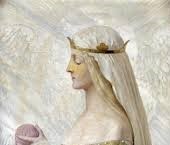
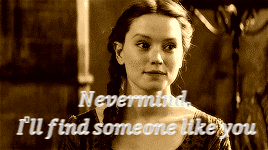



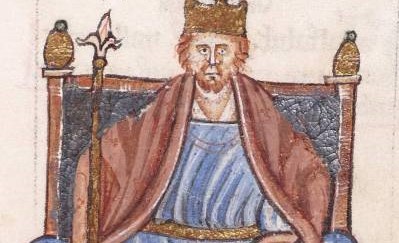

❁ « 𝔐𝔢𝔪𝔬𝔦𝔯𝔰 𝔬𝔣 ℜ𝔬𝔰𝔞𝔪𝔲𝔫𝔡 ℭ𝔩𝔦𝔣𝔣𝔬𝔯𝔡 » ❁
Godstow Nunnery, Oxford. Winter, 1176.
There has been talk, as there has always been. There has always been malicious glance of all parts as if those who casted their judgemental looks were saints themselves. As if taking their veils proved them holy.
It mattered little now than before, as if gossip and hypocrisy once troubled the peace of her spirits. She had more concerns to be preoccupied to, one of which was her own health. On that particular morning, she was unwell. Not /that/ particular morning, but every day ever since the headaches began to flow to her body somehow.
They blame my poor health for my sins.
She remembered the mater superior scowling at her. She should have been more humble, take the cross Christ put on her shoulders not because she loved dearly with all her heart, but because she was a harlot in everyone else’s eyes. In truth, was she?
Love is a sin, you ought to repent for it.
Rosamund could hear Henry’s laughters. Hal, as she used to call him, would have tell her to pay no mind to those old cows. The idea, even now, brought a small smile on her lips. But the shadow of a smile, the shadow of what once was Rosamund, was there no more. She had to repent silently and would embrace death alone. She remembered the days where the local bishops came to scowl at her for her “nature”. Some of his enemies, within the church, would come at present to insult her. She had no friends, if one at all she could name such. Even then, Rosamund had no reason to regret.
I would have done all the same if I were given the same opportunity.
Bitterly, she swallowed the tears that wanted to drop her eyes. Rosamund sighed. When looking at the walls where she was staying, still in bed, the walls made of stone were naked before her eyes, barely baring a poor cross. There was only one simple table and one simple chair, a view to the outdoors on the left through a dusty window. There were no courtins, there was nothing. But even there, Rosamund saw through the window, contemplating the clouds that were trumbling against one another in a sign of upcoming storm. Green hills with nothing but pasture and cows. Small houses and far beyond her reach she knew there were small folk doing their tasks for the priory where she was in.
If Henry saw this now, he would have surely scowled at this condition. But I don’t think he understood how little mattered the lands, the greatness, the richness in comparison to the love that flew easily between us.
Death was close, she knew. Whatever the cause of the pestilence that hurt her lungs, she knew it would soon come to an end.
How can love be a sin if all our Lord preached was love?
But it mattered not. She would cherish the memories to her heart. Rosamund coughed harder. It was cold, even though the door was closed and she had a simple blanket. She wanted it all to be as simple as it should befit her position. Most nuns would disdain her for it, but Rosamund never truly gave to other people’s opinions. She prayed now, though, for the comfort of her soul. She would not like to announce she was dying, it was vain and she had no interests whatsoever in troubling the mater superior.
In the midst of unbearable cold and painful pestilence, Rosamund closed her eyes, now lost in the past. It was more colourful and lively than the present, and although it should be said that it was never wise to dwell in the past, to seek the comfort for her soul, it’s what the former Rose of the World just did.
━━━━━✵━━━━━━ ✵ ━━━━━━ ✵ ━━━━━━ ✵ ━━━━━━
Rosamund was the youngest daughter of Walter de Clifford, a minor lord of the Welsh marches, and his wife Margaery, sometimes spelled Margaret. She had a couple of older siblings, but only Walter, Amicia and Lucia survived into adulthood. Rosamund remembered being closer the most Lucia, both in temper and age.
She recollected they often liked to dress equally as children in order to confuse their mother. It was a happy childhood as one could have back then. The world of violence, pestilence and all other mundane things had not yet reached Castle Clifford, where she spent most of her days in between prayers and sewings. Sometimes, her father would receive a wanderer bard and welcome him into his hall.
The bard would sing stories of kings and queens, courts of love, chivalrous knights who were brave enough to stand for honour and bring justice in a lawless realm. His voice was so charming that Rosamund remembered Amicia sighing over him constantly. Her mother, a woman conscious of whom she descended (from a lineage of anglo-norman nobility), could be stern at times and would not hesitate in reprehending Amicia for her childish behaviour. But their father, Walter, would laugh and say:
“Let them be children, woman.”
“They are not peasants”, it was Margaery’s response. “They are damzels, ought to behave perfectly.”
But when they were not giggling, they were behaving perfectly. Of the sisters, however, Amicia would be the most temperamental. She, like the rest of the ladies, was born with flaming hair and light brown eyes. Rosamund remembered her laughters the most, but also the one who was prompted to mischiefs. The next one, Lucia, another redheaded lady, was not so outgoing. She certainly seemed to have had an inclination to the Church, but their father refused to send any to the church. He hoped to increase the family’s health through the marriages he was beginning to seek for his girls.
And then, there was Rosamund. Her oval face showed high, pink cheeks, rounded eyes coloured brown; her nose was long and her lips, full. Her hair was also painted with red. She was the quietest of the ladies and, to her father’s despair, another one with inclinations to a religious life.
“Nay, I say!” She remembered one night her father was yelling with their mother. “I shall not send any of my children to the church! I can afford their dowry, what makes you think otherwise to suggest such a thing?”
Nonetheless, Rosamund continued going to the chapel more than thrice a day. She felt peace within it, perhaps more so than in between walls made of stone with long corridors and displayers of wealth. She knew nothing about her own ancestrality, except there may had been one great-grandfather coming from Normandy to William, the duke who suddenly became King of England not so long ago.
But she found comfort in the long gardens, well looked after by Mistress Joan, taking a seat beneath the trees and read--surprisingly an hability she and her sisters had, taught by one tutor of the church their mother hired the services--a book of poems. Rosamund shared the spirit of romance with her older sister, and it was not rare, as they grew up, they spent time proclaim poems of the sort.
In one of these early days, when a lady of their mother accompanied the girls for a stroll, Amicia would promptly say:
“Rosa, Rosa, are you not aware of how your beauty makes a man drop on his knee pretty soon?”
Lucia giggled softly, but Rosamund could not comprehend entirely. They were now into womanhood, Rosamund being no more than 17 years of age. They had not so much contact with the men, even though in their region there were growing feast to which her family was, much to Sir Walter’s pride, invited. Rumour had it that the king himself would come soon, whomever this man may be.
“What, in God’s name, are you saying, sister?���
Amicia and Lucia exchanged amused glances. Rosamund felt irritated because young ladies who did not possess completely control over their own perceptions around them would surely be irritated by such provocation.
“Father has decided the three of us will marry soon enough, and together, so one feast can be held on behalf of us!” Amicia was explaining. “He must really love us for trying to get rid of us so soon! Mayhaps not soon enough, as I reach the nine-tenth year of my life, if mother’s count is correct, and I’m old to arrange a fanficul espouse. Well, as I was saying, in between the arrangements, he made a proposition to a baron who was feudal lord to the Prince of Gwynedd for making me his wife. Yet, the man claimed he would have preferred to despouse you instead of me!”
Rosamund immediatedly interrupted the movement of her feet. Pink coloured her cheeks and her eyes went wide.
“I... I never put my eyes on the man, sister!”
Amicia laughed at Rosamund’s simplicity.
“I know you have not, but he seems to have done so. Whomever be your consort, my sister, you will make the man very happy indeed!”
Much to Rosamund’s consternation, the conversation turned to teasings that she particularly detested. She was timid when, in the rare events she went outdoors the castle whether to accompany her mother’s lady to the market or even more so to fanciful royal events her family began to attend, eyes were drawned to her figure. She hated it. It was probably due to her red locks, brighter than her sisters’s. But her mother would remember that this was a good thing, for she would not take long before arranging a suitable suitor.
Rosamund did not know back then, but lady Margaery’s amusement remark would prove to be correct. It was not any suitable, proper suitor she would capture the heart, but the one of the king of England himself.
━━━━━✵━━━━━━ ✵ ━━━━━━ ✵ ━━━━━━ ✵ ━━━━━━
The fatidic day likely occurred in a summer day, Rosamund could not be sure. The reason of why there would be a great feast for the Welsh lords was to receive the king in order to appeal his “conquest thirst” that he inherited of his great-grandfather, another conqueror.
“You should go very well dressed”, said lady Margaery to her daughters as she and her own ladies brushed their hairs and picked the best silk gowns they afforded having. Rosamund would dress a blue one with white pearls around the long sleeves, her flaming hair locked in a long braid. Her sisters would dress green and yellow silk gowns, each one lurking for the opportunity of finding a proper husband that evening. “For all the important men will be there and it’s important, God knows how, you succeeded in capturing their hearts..”
“And gold”, remarked Lucia, making all of them laugh except their mother.
“Now, Lucia, don’t be silly, child. You are no more in this age to make jests. You are a lady now.”
But the giggles carried on effortlessly. Later, at another castle built of stones, Rosamund was just another lady in between the present nobility. The hall was well provided, she could see how great--certainly bigger than the castle she grew up--were the saloon, the decorations and well dressed were the knights in their armous, but forbidden to walk inside carrying their weapons.
There were musicians too, of course, a sweet melody mastered by the fingers of such men. Rosamund remembered the tune, how it brought a comfort feeling to her heart, and how it made her smile It was her first experience in such an event and she was, naturally, as excited as any other lady in her position would be.
In more cheerful spirits was Amicia, whose hair, divided in two combed braids, fell over her green gown. She looked everywhere and would spare no smile to any lord who threw curious glances at her.
“She will sure arrange a husband this day”, Rosamund whispered to Lucia, making her sister chuckle. “Father and mother will be back home in content spirits!”
In the meantime she settled with her sisters and her father and mother went on to greet other noblemen and their wives there present, one could hear the sudden excitement that arouse from the small amount of self-entitled-important men. The king, Rosamund was told, had arrived.
At first, she was curious to see who was this man. Lucia, the brightest of the sisters, explained:
“Henry the King is the second of his name to rule all over England. He is a powerful man, vain some would say and most temperamental. Those who witnessed it, claimed that it was an awful vision to behold.”
Rosamund was not impressed, though.
“Most kings must behave in such a manner, otherwise how else will they earn respect?”
Lucia shrugged her shoulders.
“But Arthur was not temperamental..”
Rosamund smirked.
“He is not here yet, Lucia, so we must await for his rise.”
Her sister ignored the comment and carried on. As she did, their eyes followed the multitude surrounding the king. Henry the king was tall, Rosamund noticed. His hair was red, although of a different shade than hers; his face was oval and it captured strong features. His eyes, however, mirrored the smile displayed on his lips, enhancing his charisma.
“And he has quite some reputation with ladies, too. Have you not heard how he seduced the queen of France and took her as his wife?”
Rosamund’s eyes were following the king’s moves when, in this exact instance her sister was proving to be one with very attentive ears, Henry II’s gaze locked with hers. It was for a brief instance as she, paled at how intense and abrupt this encounter with each other’s eyes were, quickly looked away.
Unaware of what just happened, Lucia told Rosamund:
“Aliénor, the queen, was born in the duchy of Aquitaine. She was reported to be so beautiful and elegant, but most of all, rich because Aquitaine occupies large portions of lands in the continent.”
Rosamund rose her eyebrows:
“How on earth would you know all that?”
“Father has been receiving important people at the castle, in case you have not noticed and I’m always eager to know the stories of the court they brought.”
“And what is like this Aliénor? How did she become Henry’s queen?”
As Lucia was telling her the story, Rosamund was completely unapprehensive of Henry’s curiosity. She would not know how her red hair and soft features were a contrast amidst the other ladies with more olive skin and darker eyes than her own. She was unaware how Henry was completely intrigued by this mysterious lady whose eyes so innocent and filled with curiosity found his own. Another redhair, mayhaps, but it was not like anyone.
One of Henry’s companions followed the king’s gaze and said:
“That is mistress Clifford, m’lord. A daughter of one of the minor lords of the Welsh marches. Her name is Rosamund, she’s the youngest of Sir Walter Clifford’s brood. She’s to be betrothed soon with her sisters...” He continued to proceed, almost nonchalantly about Rosamund and her family, but Henry was only partially listening.
“Would you bring the said lady to me?” Henry interrupted him.
It was lust at first, as often was. The man hesitated for seconds, but he eventually agreed to. Who could deny the overlord of Scotland, lord of Wales and king of all England anything at all?
━━━━━✵━━━━━━ ✵ ━━━━━━ ✵ ━━━━━━ ✵ ━━━━━━
Rosamund was delighted to meet other ladies of her age. She had spent very little time outdoors and her only companions and friends she relied on were her sisters. That evening, her father and mother granted permission for them to enjoy freely as long they were under supervision of lady Margaery’s lady-in-waiting, a Welsh maid of the name Guinevere. So far, however, the only amongst the three sisters to have enjoyed more than the rules of good sense cared to permit in courtship was Amicia.
Rosamund and her new friend, a lady named Heloise, were discussing poetry when mistress Guinevere were scowling at Amicia for her unproper behaviour. It was also when the king’s valet came in between them.
He cleared his throat, and by how arrogance was stamped all over his face--which was not one very nice looking, in Rosamund’s opinion, marked by scars or old pestilences as a sign he struggled to survive infancy or mayhaps the favour of God in sparing him of such unfortunate death; his eyes were narrowed with impatience, and yet she could swear they were painted with the deepest shade of blue; the man’s nose was long, but it was crooked, a sign he was involved in unnecessary fighting or wars he was forced to fight, Rosamund could not be sure. His sandy hair was short and oily, and his cheeks were rosy. He wore dark robes that could easily mistake him to a priest. And yet, when coming to her and this new friend Heloise, the man looked as if he was mostly obliged for doing so, an interpretation that, as she would find out, was not entirely incorrect.
“Mademoiselles”, he began with a heavy French accent. Luckily for him, Rosamund could speak the language, but pretended she would not understand him. Maybe he understood it, for he, against his own will, was forced by circumnstances to speak the local tongue. “Mistress Clifford. His Grace, the king of England, wishes to see you.”
Lady Heloise covered her mouth with her tongues, but Rosamund, as flattered as she might have felt with the attention of such a king, was not entirely sure if she should meet a man let alone a king.
“For what purposes, my lord, would the king be interested in seeing me, a mere damsel?”
She could tell her lady friend was very much puzzled by her words, which, Rosamund thought, could be seen as a demonstrative arrogance, when in reality she was motivated by her pious education she received. Surely her mother would be very displeased if she heard of such a thing? Her flower should be preserved for her marriage.
As naive as she may have been, Rosamund did not lack brain.
“Alas!” The king’s valet exclaimed, for this was the first time he found in such situation. Rarely would a lady, whomever she may be, question such a thing. “For what purposes? The king has taken a like of you, my lady. Should there ever be another reason for it?”
He laughed.
“’Tis the king of England we are talking about. Should we leave him wait for more than we already have?”
Rosamund flushed. She understood her position as an unmarried dame in those days, and because of it, remembering Henry II, as king as he may be, was still a man and a married one. She would not go against the laws of the Church.
“I may sound a fool to you, mister, but out of respect for the queen he is lawful married before God and for me, a damsel who has not yet become a respectful espouse to some lord, I cannot give in to such follyness.”
And without waiting for response, she stepped away, moving straight to the direction of mistress Guinevere with a very shocked lady Heloise by her side, stunned as she was what was seen for she said no word. Rosamund’s face was all red and one could easily tell how angered she was.
“There you are, Rosa!”, said Guinevere, greeting the other’s friend. “I see you have acquainted yourself with other admirable ladies, but your face shows me displeasure. What, in God’s name, has been the cause of such distress?”
Lady Heloise, who payed no mind to discreetion, spoke for Rosamund:
“The king wanted to see her and she declined him!”
Guinevere and Rosamund’s sisters looked puzzled at her, whose pale pinks were painted with another shade of deeper red if possible. She could not meet their inquiring gazes, so her eyes were down to her feet.
“How did this happen?!” Amicia, naturally, was the first to say, quickly taking her sister’s hand into her own. “You should not decline, my dear Rosamund. Oh, how fair are you! God has a purpose for you, my sister, as I have always known! ‘Tis with what other reason for being born ever so graceful and fair as yourself?”
“My dear sister, do not say flatteries to me”, pledged Rosamund. “I am not a harlot, and cannot give into such reputation. He is a married man.”
“He is the king of England”, said Amicia, eagerly. “We could have benefited from it.”
Impatient, Rosamund, who realized she would not receive support from either mistress Guinevere, who looked astonished by the reports Lady Heloisa unashamed gave her, nor her sisters, who suddenly forgot all morals about involving oneself with a married man.
Silently, she slipped off their companionship and in even quieter frustration she moved to an empty are of the castle, wherever this may be. Perhaps the gardens? But she would not dare to go to such a darker spot. No, the hall would be nice. There were guards, one or two small groups engaged in conversations, so she sat at a far from the crowd bench where she sat.
But there would be no time to contemplate alone with her own thoughts for Henry, king of England, was not one very accostumed to receive declines to the invites he extended to those he appreciated. He was rather intrigued by what cause had motivated her to deny him the pleasure of her company and his eyes never left her face or moves in this time. Even the group that surrounded him was aware his mind was out of reach.
Henry observed as Rosamund stomed over, face flushed probably the result of being offended. He began to wonder if that was because of him. By how her sisters behaved, or so he assumed being the ladies under the supervision of an older mistress, he presumed so. Discreetly, the king excused himself off the duties and began to search for her. Did not take long before he did.
“I pray I have not troubled the peace of your mind”, spoke he with a heavy French accent.
Rosamund pale, startled when hearing his voice. Her eyes went wide and she quickly dipsied to a curtsy when raising from her seat. But, seeing the fear in her eyes, Henry could tell where this refuse came from. He quickly said:
“Please, my lady, be fearful not of me. I came here to apologize.”
Rosamund’s features soften, although there remained in her eyes a mixture of amusement and suspicious.
“Apologize, my lord? For what cause would have the king to apologize?”
“My lady, you mistake me to an arrogant and distant creature...”
“And are you not, sire? A king unreachable to many of us, your subjects?”
He sighed. But Henry was decided not to give in as much as Rosamund.
“I’m still the son of the Lord as much as you, madame Clifford. A crown placed over my head because of His command, solely so. I did not mean to offend you.”
Rosamund’s eyes remain locked with his, but her body languaged indicated she still distrusted him.
“I... How can I think otherwise? I am a damsel, Your Grace, not a harlot you can share a bed anytime. I am unmarried, and what will people think if they see us engaging in conversation out of their sight like this?”
Henry took a seat on the bench she was formerly sat. She watched frustration, and maybe anger, rise in his features, but countered somehow by resignation in his eyes. Those eyes were painted in deep blue, and Rosamund thought it must like seeing the sea, for there was something in them that could drown her. A shiver came in and she quickly lowered her eyes to her feet. She could not... She could not...
“To the hell the men and their malicious minds. I came not to pervert your innocence, my lady. I see I did make the mistake in thinking you were like the others when you are not.”
“The path is free for you to go then, sire, for I will not give you what you came to seek”, she heard herself speaking.
When did I ever become this bold? And before a king?!
But Henry laughed. And his laughter sounded like a thunder, giving much cause for the raise of Rosamund’s gaze, for she was intrigued at how... human he sounded. He, so divine being, could truly be a man?
“You captivated me, my lady. May I not enjoy your company throughout this evening?”
“I fear to say there would have more interesting damsels to accompany your lordship, but if it pleases you, sire, I shall stay” she said, humbly.
Henry gave space for her to seat, patting it so she could seat. Rosamund, not any less uncomfortable than she was before, obeyed.
“It pleases me. But does it please you?” He inquired, his eyes looking for hers.
Rosamund flushed.
“I... I... Why would you ask this, sire? You are the king”, said she, softly.
“For this same reason you exposed, my lady Clifford. Because I am the king, people assume what do I want and desire, and for long years this was enough for me. But to live amidst the flattery and falsehood is becoming tiresome. It is as if I live in illusions, illusions that could never grasp the reality I aimed to live.” He explained.
Rosamund found herself surprised by his words. Somehow, she sensed the truth beneath them.
“How did you become king, sire? Looks like a heavy task to burden your lordship to.”
Henry shrugged his shoulders, but his eyes were no longer holding hers, staring, instead, into the void of what Rosamund presumed to have been the past, of years she never witnessed or heard of.
“I have inherited my mother’s claim. You are not familiar with the whole thing, are you?” A smile crossed his lips when seeing Rosamund shaking her head in negative. Somehow it made his chest swollen with pride. “It all began from the day my uncle, my mother’s brother, was drowned. His ship hit a rock or something of the sort, and he tried to save the people that were in the same ship as his. By doing so, he died.”
“My condolences for his loss”, Rosamund whispered.
Henry smiled. It was a more sincere one, Rosamund observed.
“I appreciate it, but I fear to tell you that us, royals, display of little time to grief. My mother was his heir, her father, the first king named Henry of this realm, made his nobles to vow loyalty to her, but he should have known that men are like beasts. They switch their loyalties easily as gold”. He now spoke with a sudden bitter that intrigued Rosamund even more.
He carries his scars, his pain, his hurt and buries them beneath out of the general sight. Oh, how heavy must be to carry the crown over his head!
“He died and my mother should have been crowned, but she was pregnant at the time of his death, so that gave space for Stephen to usurp her rightful place as lady of the English. It was a civil conflict that, in the end, brought me here.”
Rosamund listened, and Henry was surprised for her genuine listening. Not even his wife would do such a thing, he noticed.
“You sound unhappy for the events that led you here, sire, if I may speak freely.”
“You may speak freely as you wish, as I have said, it tires me to hear flattery most of the times.” He said. “I shall not be untrue to you, my lady, but I do enjoy being king. What abhorres me the most is their motivations, how easily convertible are their loyalties. In one day they welcome in feasts like these, in the other they are plotting against me.”
Rosamund listened again, unsure of what judgement should she give him, although she presumed he was being sincere. She never met too many men who would speak with their hearts, or any man who did so at all, but his eyes... when looking into her own... There was something unexplainable to her. Yet, she had to be realistic, as much as, surprisingly to her, it would be disappointing to taste the flavour of it when she said:
“But your wife, my lord... Surely she would support you as a queen should.”
Henry made a sound that Rosamund was not entirely sure what it is, by how his features changed all of a sudden, it looked like the queen did not make this king happy either.
“She does not. All she cares about is her court of love she tries to reproduce in Westminster.” Henry scowled. “Her vain courtiers doing all she pleases, her children...”
“Who are yours too”, she kindly reminded him.
“Well, she acts otherwise!” Henry said with gritted teeth.
Rosamund said nothing more, but instead allowed him to speak out the anger within. As far as she understood, one of the major issues with the queen was having his illegitimate children raised with their legitimate ones and favouring one son over another in all matters. There were the legacies involved too, a series of issues that, from her perspective, were faulted on both parts. Although she could not understand why a mother would favour one son over the other, which made her furrow her eyebrows.
This captured Henry’s eyes, for of all he told her, it was only in the matter of children that he received some reaction of her.
“What is it that is troubling you, my fair lady?”
Rosamund blushed at the compliment, but ignored it when responding him:
“Forgive me, sire, for I am not a mundane lady. I know little of this world, and understand even lesser the complications of motherhood. Whilst I comprehend what lies before me when marrying a lord, I cannot discern how a mother’s love surpasses all other children to concentrate in one alone.”
Henry smiled at her.
“Your remarks are far more intelligent than any other lady I have ever heard.”
“That is untrue, sir”, protested Rosamund, although a small smile curled upon her rosy lips. “For your lady wife is famed for doing good use of the brain she has.”
“Whilst this is accurate, I cannot say she has been using it on good matters.”
Rosamund smiled.
“What other matter could occupy a lady’s mind out of a lady’s own world? Hence why I cannot see the choice of one son over another.”
“Preferences”, it was all he said, vaguely so.
Seeing this was a subject he was not particularly into, Rosamund decided to quiet her thoughts. But Henry said:
“On what account have you stopped the conversation, my lady?”
“Sire, there is little reason to go into a topic that leaves you uncomfortable. I think we should divague on other matters.”
“Such as...?”
But their conversation came abruptly to an end. For the father of Rosamund, Sir Walter, apparently “finally” discovered the whereabouts of his youngest daughter. The scene, to his eyes, could hold no indecency of unproper behaviour, but, nonetheless, the reputation must be conserved. Yet, to the end of that day, Sir Walter could have not been any more proud than any other man would be in his shoes if his daughter had captured the powerful king’s heart.
━━━━━✵━━━━━━ ✵ ━━━━━━ ✵ ━━━━━━ ✵ ━━━━━━
Henry the king was decided to spend more than one day or two in the states that were close to the Clifford’s family. His presence was an opportunity for the local nobility to receive him in rich and luxurious feasts, but also to the ambition Sir Walter who wished to expand and enrich his own family.
Rosamund, however, cared little about her family’s desire of enlarging the gold and properties. She was much surprised to see a different side of the king than she was told of. He was respectful, kind, even sentimental. But, at this, her mother warned her:
“Men in general have many masks, my dear child. The powerful they are, the more artful they can be to conquer a woman’s heart. You should know well what you are doing...”, and in a less severe manner, added she, “if you are not willing to this courtship, we can find a more urgent matter for you.”
But Rosamund was not entirely sure of what would be of her. So she said nothing of the matter. Her mind was confusing, whilst her heart was clear. It was not merely an attraction of minds, but of souls. The answer was there: she hoped to see him again even if this was wrong in so many ways.
***
Rosamund was discreet and there was no reason to behave otherwise, although if this was Amicia, perhaps everything else would have gone differently. But there she was, with a friend or two (lady Heloisa was amongst them, even if she wanted the gossip that Rosamund refused to give her) and her sister Lucia. The feast was charmed with the melodies that brought many men and women together in a dance.
Rosamund herself, on that day with the red locks loose and dressing a blue gown with esmeralds, danced with two of the King’s courtiers. She knew he was watching, his eyes glued on her moves as if he could see beyond her curves. For when their eyes met, it was a signal of recognition, of something more, one mirroring another’s soul, a feeling that could only be found in letters of the books, in the mouths of the bards, in the minds of the thinkers.
She danced gleefully, the rhythm of her heart racing louder each time their eyes meet. She lowered her gaze, she timidly followed the tune with her partners, she laughed with her lady friends, but all the time she could not help... those eyes of her sought for his, and his were waiting for hers.
Discreetly, the king inquired after her. Discreetly, they met and strolled at the gardens.
“You dance gracefully, I should say”, said he, sounding soft as words rolled out of his tongue. “I could not look away and must admit I was envious of your partners.”
Rosamund smiled and Henry decided he liked the way it naturally came everytime at his wording.
“I thought you disliked flatteries, sire.”
“I do, but must I protest that I speak the truth to you, dear lady! O, fair Rosamund, can you not see how the world’s eyes fall on thee?”
She giggled, her fingers slipping on the arm the king had offered her to take, gripping it gently. The scent of roses that day already mesmerized him, completely taken by her presence.
“You are a poet too, sire?”
“I have one brother who is. I, myself, am mostly a warrior. One of the reckless kind”, he winked at her. “But he inspired me. William was a good man.” He sighed.
“Oh. Did he..?” She could not pronounce the words, unsure of how he would react.
“Aye.” Henry lamented, his eyes missing the joy of minutes before, as if stolen by the sadness of eternal grief. “This world was not for him, though. He must be in peace. He was very good, pure. Unlike Geoffrey.”
On that late afternoon, Rosamund was content in hearing about his brothers, his stories, and even of the illegitimate siblings Henry had. She was told of his children, of his life.
“But I’m talking too much!” objected he, when they finally took a seat in the centre of the garden. Rosamund noticed they were now out of the people’s sight, especially the guards. “Will I not hear a word of my fair Rosamund?”
She giggled.
“Must I, sire? What could possibly interest the king of England? I am a damsel, daughter of a local nobleman.”
“Do not think of me as a king, my lady, I beg you”, said he, enamorated. “All I ask you is to speak freely to me. I would sincerely like to listen to what you have to say, your habits, what you like to do or not.”
Rosamund conceeded a smile.
“If you insist...”
“I do!”
She locked her hand into another, resting them on the top of her lap after adjusting the skirts of her gown. Rosamund would look down a few times, sensing the heat in her cheeks at how, not once, did the eyes of Henry divert from her presence. When she raised her gaze, he was still glancing at her. Not only glancing, but listening.
He was actually listening.
“I appreciate the simplicity”, she told him at last after telling the story of her family, her habits, even that of her neighbours, the few she ever had been acknowledged to. “The nature and their freedom, the stories the bards so often tell and sing about. Love inspire me. It’s all I ever come to know, although more through words than anything.”
Twilight began to set it’s mixture of lights when their conversation seems to come to an end. The king rose and so did Rosamund when they began to stroll back inwards.
“I miss the simplicity, the basics. Whilst I for one admit to enjoy all the luxury that life in my position can provide, I also crave for a life with no concerns. Could this be possible?”
“I like to think, my lord, that no life is possible without faith beforehand. Otherwise, where else would be placed the purpose of our existance in first place? It is only then that comes the nature of simplicity we aim to achieve. And the love we long to feel.”
To talk about deep perceptions of the world, however limited one could be in comparison to other due to the experiences one had and the other lacked, was something that brought such delight to Rosamund. It was a feeling that Henry himself reciprocated, something he desperatedly looked for in every lady he fell for. But in reality, he knew it now, all the love he thought he felt for others was the reflection of lust. For little by little he could see that she gave him what he needed the most: love.
━━━━━✵━━━━━━ ✵ ━━━━━━ ✵ ━━━━━━ ✵ ━━━━━━
Rosamund believed they would only meet in only luxurious occasions, but this was not meant to be. Sir Walter would proudly say, as the days turned to weeks and weeks to months and he began to enlarge his properties, that never before he was so lucky to have had daughters. In the month after Rosamund and Henry began to court, Amicia and Lucia were promptly married. Amicia, to a baron named Osmund FitzHugh of Richards Castle, and Lucia to another baron named Hugh de Say of Clun Castle. Now there was only his son to marry and he hoped the king could find him a wealthy heiress for the union to be perfect.
As before, Rosamund did not feed ambitions in herself. By then she had accepted her fate, and cared very little about the whispers around the village. But her brother had to walk her down the market each time, so she would be the victim of loud accusations for being the king’s whore. It once hurt before, but she would not hear none of it.
Henry visited her every month, discreetly as the lovers usually were. But he insisted her for having her own household and would not take ‘no’ as answer. He granted her a household thus in a castle made of stones located in Oxfordshire, near Woodstock. There, they would meet... and there, she knew, they would consummate their flames for the first time.
Henry had been wholly respectful of her and, much to her surprise, he would wait for her. So it was towards the summer that, even to her mother’s delight, she moved to her own household, having her servants and ladies to attend her. During his absence, lady Margaery would make company to her daughter, helping her to adjust to this new life, teaching her how to manage it properly as a lady befit to her station should. A chapel would soon be built and lady Margaery thought wise to find one priest who would not refuse the task of preaching a holy life without risking to ruin her daughter’s reputation.
Mid August, Henry told Rosamund he was going to visit her. She decided to receive him properly. Bards were already displayed singing to the guests she placed in it. Only her sisters and their families were attending it, of course. That day, she decided to have her hair loose and dress Henry’s favourite gown, the blue one with while pearls.
In her ears, she wore saphire earrings and necklace to embelish her porcelain skin. Now more accostumed to his valet, going as far as befriending him (and he would espouse a friend of hers, that lady Heloise, laterwards), she received him well.
“Your master is coming, my lady”, he warned her happily. “He is looking forward to see you again.”
Rosamund was in the highest expectations. She was not expecting his full fidelity, aware of the nature of the men, but to possess his heart wholeheartedly as he did hers. Furthermore, there was the love that, two years ago from now, never ceased to diminish.
Henry finally then appeared, dressed in his rich clothes. Rosamund forgot the etiquette and ran to his arms, embraced those strong arms as he greeted her gleefully. She felt his love deeply when his lips touched against her cheek and then moved to her lips. Oh, how much he was longed for!
“A feast to receive me, my lady?” said Henry, smiling widely.
“It should be especial to receive you properly, my lord”, responded she in turn, with her rosy cheeks. “I pray ‘tis of your taste, though. Nothing gladdens me more than pleasing your lordship.”
The sincerity in her words warmed his heart with full affection. He pressed his forehead against hers before pecking her cheek:
“Aye, how else could I not be? My eternal gratitude shall never be forgotten!”
That night, he conceeded a dance with her, earning a round of applauses of the guests. He then watched her dance with her ladies, and greeted and talked with his lover’s relatives. Finally, then, when it was late night and he was half drunk already, a lady of hers told him he was being summoned by her mistress.
Curious as ever, Henry obeyed the instructions and went after the bedchamber where he usually spent the night. Once inside, he was surprised to see her... disproved of her gown.
“Rosa...!” he gasped, quickly closing the door behind him.
Rosamund was found lying on the bed naked, her eyes searching for his as her exposed skin much gave signs for longing for him. He approached, undressing himself on the way to attend the invitation, but hesitated.
“I thought...”
She inclined against him, feeling not embarrassment for her nudity as she feared, but suddenly confidence for her curls. Perhaps this was the wine, but she would not like to let go of it. She felt the eyes of his possessing her, but Rosamund want his touch.
She grabbed his hands and placed them over her full breasts, not before she rose his chin and inclined her lips against his.
“Well?”
“I’m yours to command”, he whispered, his voice rusky filled with desire.
He laid her on bed and embraced her warmly, giving her the love she needed--and he needed too. Whilst ‘twas true that he bedded other dames in the years of their unconsummed relationship, hers was his devoted heart and his most hungered desire. ‘Twas so that they slept barely as their bodies loved throughtout the dawn.
“And the bards will sing about a king who loved a damsel of flamed locks, she who gave her heart in a box for him to remember in every equinox.” He proclaimed against her ears.
“They will remember that there shall be no other lady in this world who worships her lover more than I do, for if there was something I could dispose to be with him that would be the heart for you to carry within.” She smiled, drowning in those deep blue eyes as she feared one day she might.
In moments like these, eternity was a vow both swore to keep. But future had it’s own shadows none could predict. Yet, whilst it lasted, they met and even when it did not any more, their love remained attached.
━━━━━✵━━━━━━ ✵ ━━━━━━ ✵ ━━━━━━ ✵ ━━━━━━
Winter, 1176.
Henry was at Dover. He needed pure air to breathe, he needed to be parted from the world he knew. For he received the news he feared to hear, he feared to have ever been told.
“Sire, we received news from the priority of Oxfordshire. It tells us that lady Rosamund Clifford is no longer amongst us. She... She is dead.”
Away of the public sight, he grieved. Away from the high walls of castles built upon stones, away from the ghosts he lost, he longed for the one he had loved the most.
Alone, he fell on his knees, devastated. He never wanted her to leave, never to be apart, but damn the circumnstances. He remembered her touch, her caring, the sound of her laughters. He never wanted her to leave...And neither wanted she.
So wept and grieved the king of England for the loss of his most beloved treasured his heart ever possessed and craved for: the love of the rose of the world, the love of Rosamund.
But maybe, in another life, in another time, God would have wanted them to meet again.
➳ lyrics: Adele, “Someone Like You”.
➳ fancast: Daisy Ridley as Rosamund Clifford and Tom Hiddleston/MichaelFassbender as Henry II, King of England.
#Henry II#Henry x Rosamund#Henry II x Rosamund Clifford#Henry II of England#King Henry II of England#Henry FitzEmpress#Rosamund Clifford#tom hiddlesto#daisy ridley#Michael Fassbender#my edits#Plantagenet edit#house of anjou#Plantagenet dynasty#The Plantagenets#Plantagenet#angevins#Angevin Empire#Angevin Emperor
24 notes
·
View notes
Text
Queen Matilda: A Remarkable Woman of Medieval England!
In the annals of history, few women have left as indelible a mark as Queen Matilda of England. Born in 1102, Matilda, also known as Empress Matilda or Maud, was a woman ahead of her time. Her life was marked by power struggles, determination, and an unyielding spirit that made her a true trailblazer in medieval England.
Matilda was the daughter of King Henry I of England and Matilda of Scotland, making her a member of the esteemed House of Normandy. Her early life was spent in the English court, where she received a rigorous education, unusual for women of her era. She developed fluency in Latin and several European languages, which would serve her well in the tumultuous years to come.

Her life took a significant turn when she married Henry V, the Holy Roman Emperor, at the tender age of 12. Matilda's marriage to the Emperor elevated her status, but it was her second marriage to Geoffrey Plantagenet, Count of Anjou, that would prove to be most politically consequential. This union laid the foundation for the Angevin Empire, which would span England and much of western France.
Matilda's resilience shone through during the turbulent period known as "The Anarchy," a civil war between her and her cousin Stephen of Blois for control of the English throne. Her claim to the throne was strong, as her father had designated her as his heir before his death. This tumultuous struggle lasted for nearly two decades, but Matilda's unwavering determination paid off when her son, Henry II, ascended to the throne in 1154, marking the beginning of the Plantagenet dynasty.

Queen Matilda's legacy extends beyond her role as a political figure. She was a patron of the arts and culture, promoting the development of courtly love and chivalry in medieval Europe. Her court became a center of learning and refinement, fostering intellectual pursuits that would shape the course of history.
Queen Matilda's life was a testament to the strength and resilience of women in a male-dominated world. Her intelligence, determination, and political acumen paved the way for the rise of the Plantagenet dynasty and left an indelible mark on the history of medieval England. Her story serves as a timeless inspiration for all those who dare to challenge the status quo and strive for greatness in the face of adversity.
#queen matilda#richard the lionheart#eleanor of aquitaine#robert the wayward prince#wars of the magna carta#william the conqueror#king richard of england#civil war in england#king john
0 notes